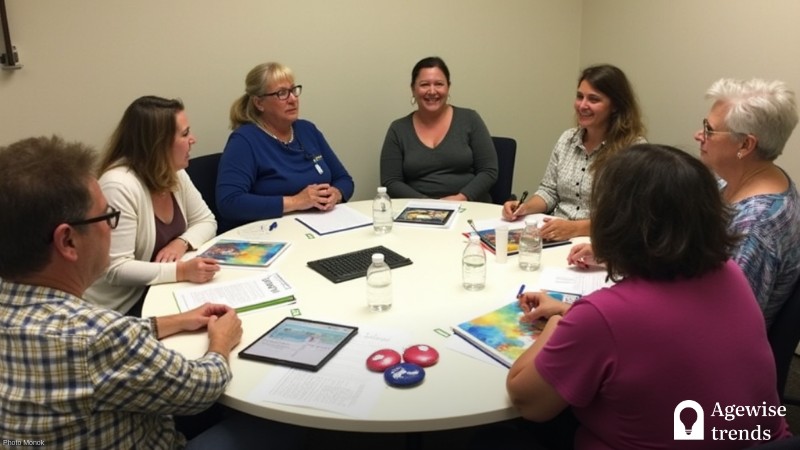Recovery from addiction relies on community support, which boosts long-term sobriety through emotional encouragement, accountability, and resources. Studies show that those with social support networks experience lower relapse rates and higher treatment success.
Community involvement extends beyond moral support, offering structured recovery programs, peer groups, and access to crucial services like housing, employment, and healthcare.
Key Takeaways
Recovery from addiction relies heavily on community support, which boosts long-term sobriety through emotional encouragement, accountability, and resources.
- Peer-led groups like Alcoholics Anonymous (AA) and Narcotics Anonymous (NA) offer safe spaces for shared experiences and mutual support, leading to fewer relapses and higher life satisfaction.
- Recovery community organizations (RCOs) provide practical help, including employment, housing, and skills training, essential for rebuilding post-addiction.
- Social connections empower individuals to pursue a healthier, substance-free future, demonstrating that recovery is a journey best faced together.
The role of community in recovery
Addiction isolates individuals, making recovery hard without support. Community involvement provides encouragement, stability, and guidance, helping reduce loneliness and build resilience.
Peer-led groups like Alcoholics Anonymous (AA) and Narcotics Anonymous (NA) offer safe spaces for shared experiences and mutual support, leading to fewer relapses and higher life satisfaction. Recovery community organizations (RCOs) offer practical help, including employment, housing, and skills training, essential for rebuilding post-addiction. Many also provide mental health resources to address the link between substance abuse and psychological well-being.
Types of community support for recovery
Various community support forms aid recovery. Recovery housing provides a sober environment with rules that reduce relapse triggers, helping individuals stay committed to sobriety.
Peer support services, like mentorship and counseling, connect individuals with those who have experience in recovery, fostering trust and motivation to stay on track. Mutual aid groups such as AA and NA use a 12-step approach, emphasizing personal responsibility and collective encouragement to maintain sobriety.
Support groups for seniors address addiction challenges specific to older adults, offering both in-person and online options for tailored, accessible support. Community programs like fitness groups, creative arts therapy, and outdoor retreats help individuals build coping skills and meaningful connections with others in recovery.
How social support improves recovery outcomes
Social support plays a key role in recovery by addressing emotional needs, reducing stress, and combating isolation. Studies show that strong social networks increase the likelihood of completing treatment and maintaining sobriety.
Family and friends are vital in reinforcing positive behaviors and creating a supportive environment. Their communication, patience, and understanding help individuals overcome recovery challenges.
Community involvement gives individuals a sense of purpose and belonging. Activities like volunteering, attending meetings, and socializing provide motivation and structure, which are crucial for long-term recovery.
Mental health and peer support
Substance use has an emotional toll, often causing anxiety, depression, and stress. Peer support groups offer a judgment-free space to share struggles, build confidence, and develop resilience.
Connecting with others in recovery fosters belonging and purpose while offering practical strategies for managing cravings and setbacks. For those unable to attend in person, in-person and online options like virtual support groups and telehealth counseling ensure accessibility and inclusivity.
Building a support network for recovery
Establishing a strong support network requires active effort. Here are some ways individuals can build and maintain connections that support their recovery journey.
Join a support group – Participating in AA, NA, or SMART Recovery meetings helps individuals stay accountable while receiving guidance from others on the same path.
Develop sober friendships – Building relationships with others in recovery fosters motivation and reduces feelings of loneliness.
Stay connected with family and friends – Open communication with loved ones can provide encouragement and emotional stability.
Volunteer or engage in community activities – Helping others can enhance self-worth and reinforce personal commitment to sobriety.
Use online recovery resources – Virtual support groups, mobile apps, and online forums offer additional tools for maintaining recovery.
Overcoming challenges in recovery
Recovery is not a linear process, and setbacks can occur. However, a strong support system can help individuals navigate challenges and stay committed to their goals. Seeking help when needed, staying engaged with recovery communities, and maintaining a structured daily routine all contribute to long-term success.
It’s important to recognize that recovery requires patience and self-compassion. Engaging in therapy, practicing mindfulness, and setting realistic goals can further strengthen a person’s commitment to sobriety.
Recovery is more successful with strong community support. Peer groups, recovery housing, and community programs play a vital role in reducing relapse and enhancing well-being.
Meaningful relationships offer strength and motivation, making community involvement key to lasting sobriety. Social connections empower individuals to pursue a healthier, substance-free future, demonstrating that recovery is a journey best faced together.














